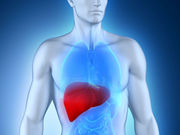From 1998 to 2013, improvement in overall, transplant-free survival in patients with ALF
TUESDAY, April 5, 2016 (HealthDay News) — For patients with acute liver failure (ALF), overall and transplant-free survival improved from 1998 to 2013, according to a study published online April 5 in the Annals of Internal Medicine.
Adrian Reuben, M.B.B.S., from the University of Texas Southwestern Medical Center and Baylor University Medical Center in Dallas, and colleagues conducted an observational cohort study at 31 transplant centers in the United States involving 2,070 patients with ALF. They compared clinical features, treatment, and 21-day outcomes over time annually and stratified into two eight-year periods (1998 to 2005 and 2006 to 2013).
The researchers found that throughout the study period the overall clinical characteristics, disease severity, and distribution of causes remained similar. Between the two eight-year periods, the 21-day survival rates increased (overall, 67.1 versus 75.3 percent; transplant-free survival, 45.1 versus 56.2 percent; post-transplant survival, 88.3 versus 96.3 percent [all P < 0.010]). The investigators also observed reductions in the use of blood infusions, plasma infusions, mechanical ventilation, and vasopressors; use of N-acetylcysteine increased. Overall survival and transplant-free survival increased throughout the study period when examined longitudinally throughout the 16-year period.
“Although characteristics and severity of ALF changed little over 16 years, overall survival and transplant-free survival improved significantly,” the authors write. “The effects of specific changes in intensive care practice on survival warrant further study.”
Several authors disclosed financial ties to the pharmaceutical industry.
Full Text (subscription or payment may be required)
Copyright © 2016 HealthDay. All rights reserved.








